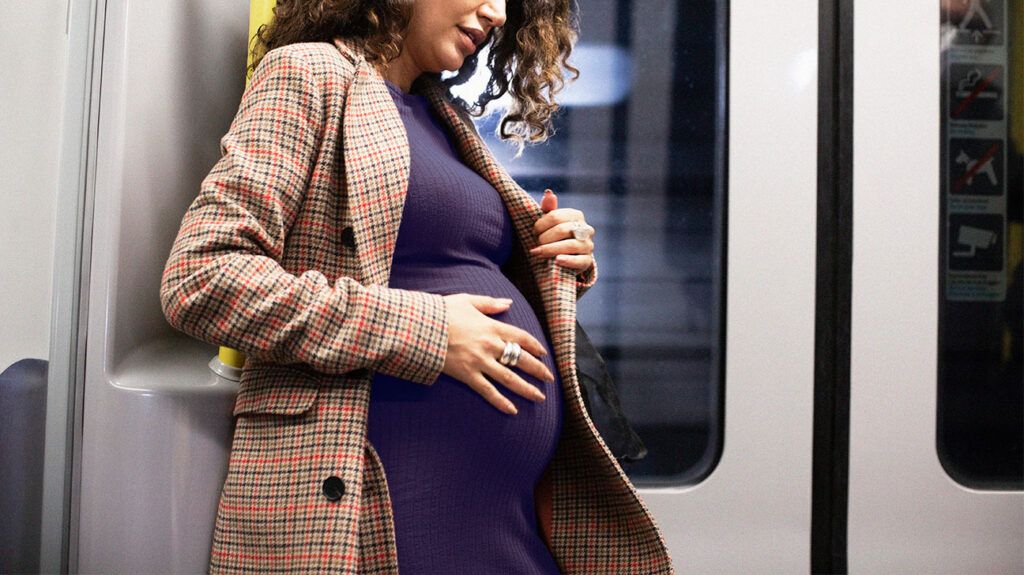Anorexia may increase the risk of complications during and after pregnancy. In some cases, pregnancy may increase the risk of developing an eating disorder (ED) or relapsing.
It is important to seek help if someone has anorexia during pregnancy or following childbirth. A person can contact a doctor or mental health care professional for help.
This article looks at the possible link between anorexia and pregnancy, how anorexia may affect pregnancy, treatment options, support, and more.

According to a 2019 review, anorexia nervosa affects 0.3 to 1% of the population. Additionally, between 5% and 7% of the population may have disordered eating that does not meet the clinical criteria for anorexia but is nonetheless a problem.
The frequency of the condition is highest in females of childbearing age.
In some cases, the physical, emotional, and psychological effects of pregnancy may increase the risk of developing or experiencing a relapse in eating disorders such as anorexia nervosa.
Certain changes that occur to the body during pregnancy, such as changes in body shape and weight, may be a trigger for anorexia during pregnancy.
Research has found that people who were pregnant and had a recent ED had the following differences in comparison with control groups:
- reported greater concerns over body shape and weight gain while pregnant
- increased dieting
- increased use of laxatives
- increased use of self-induced vomiting
- increased risk of hyperemesis gravidarum, which involves severe nausea and vomiting during pregnancy
A 2022 article suggests people with a history of EDs may be more vulnerable to relapse while pregnant, compared to other points in their lives.
Reasons for this may include the following:
- The stress relating to pregnancy and becoming a parent may lead to an uncontrollable need to restrict weight or food intake.
- People with a history of eating disorders may find it challenging to accept changes to their bodies.
- Pregnancy may put challenges on mental well-being, which may make a person more vulnerable to mental health conditions.
- Pregnancy may make someone feel out of control of their body, which may trigger behaviors in an attempt to regain control.
- Changes in food preferences or cravings, emotions, and body shape may all make a person feel out of control.
People with anorexia during pregnancy have an
Anorexia during pregnancy may pose risks and complications for the pregnant person and their fetus.
These risks can be due to many factors that link to anorexia,
For pregnant person
Possible complications for the pregnant person
- anemia
- hyperemesis gravidarum
- preeclampsia
- threatened miscarriage, which is vaginal bleeding during pregnancy
- increased risk of substance misuse
- premature rupture of membranes
- preterm delivery
- increased likelihood of C-section delivery
- increased risk of death
For baby
Possible complications for the fetus
- intrauterine growth restriction, or fetal growth issues
- low birth weight
- small for gestational age birth
- microcephaly, in which a baby’s head is far smaller than typical
According to a
It is important that people continue to seek help and support from a healthcare professional following delivery.
A 2021 review suggests people with anorexia may chest or breastfeed for a shorter length of time than people without anorexia. Those with eating disorders may also experience a higher frequency of issues during breastfeeding.
Although people with anorexia may have fluctuating or irregular menstrual cycles, there are likely periods in which the body partly recovers from a restricted energy intake.
This brief increase in energy intake may cause infrequent ovulation, allowing pregnancy to occur.
It is important to seek help if someone has anorexia during pregnancy or following childbirth. People can contact a doctor or mental health care professional for help.
There is plenty of support available. People may find the following resources helpful:
Treatments for anorexia
- psychotherapy
- cognitive behavioral therapy
- nutritional counseling
- medical care and monitoring
- medications, such as antidepressants or mood stabilizers
Pregnancy can cause physical, emotional, and psychological changes that may trigger eating disorders such as anorexia.
Anorexia during pregnancy can increase the risk of complications during pregnancy and birth for both the pregnant person and the fetus.
Getting proper support and help from a healthcare team during and after pregnancy can help people better manage potential risks.


